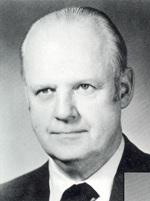 I guess I’ve long been the biggest Roy Harris fan left. In my youth I would occasionally run across a vinyl record of music by one of Roy Harris’s students, who wrote in a similar style, named Robert Palmer; I remember his cantata Abraham Lincoln Walks at Midnight, but no longer have a recording. Recently, in my research into Ives, Blitzstein, and other composers, I’m starting to run into Palmer’s name again, partly because John Kirkpatrick championed his piano music and would occasionally mention him to Ives. So I went to see what remains of his music out in the world; I already had his Third Piano Sonata and some choral music, and I found a delicious Clarinet Quintet and Piano Quartet, as well as a Second Piano Sonata with a Harrisian first movement in 5/8. Palmer’s piano music tends to be rather jumpy in the asymmetric, repeated-note way so characteristic of mid-century Americana, but his chamber music drapes long lines over nostalgic harmonies bittersweetly tinged with bitonality – qualities I adore and aim for in my own music, though I’m coming from minimalism and he came from neoclassic sonata form.
I guess I’ve long been the biggest Roy Harris fan left. In my youth I would occasionally run across a vinyl record of music by one of Roy Harris’s students, who wrote in a similar style, named Robert Palmer; I remember his cantata Abraham Lincoln Walks at Midnight, but no longer have a recording. Recently, in my research into Ives, Blitzstein, and other composers, I’m starting to run into Palmer’s name again, partly because John Kirkpatrick championed his piano music and would occasionally mention him to Ives. So I went to see what remains of his music out in the world; I already had his Third Piano Sonata and some choral music, and I found a delicious Clarinet Quintet and Piano Quartet, as well as a Second Piano Sonata with a Harrisian first movement in 5/8. Palmer’s piano music tends to be rather jumpy in the asymmetric, repeated-note way so characteristic of mid-century Americana, but his chamber music drapes long lines over nostalgic harmonies bittersweetly tinged with bitonality – qualities I adore and aim for in my own music, though I’m coming from minimalism and he came from neoclassic sonata form.
I am astonished to learn that Palmer died only in 2010 – Grove doesn’t even list his end date yet – and next year will be his centenary. He lived to be 95. I wish now I had run across his name again a decade ago, for he would have been a wonderful person to interview, not only because he seemed near the center of American musical life during the WWII era but because I am hungry for more of his own music. Grove lists his most important teacher, more than Copland or Harris, as Quincy Porter, another figure whose chamber music I carry a brief for. Palmer got a teaching job in Kansas in the 1940s and soon after went to Cornell. One supposes he faded from the composition world, as “conservatives” did, due to the uprising of serialism in the ’60s, but he lived long enough to see the Americana school to which he belonged partly restored to favor, yet without seeming to have re-emerged with it. (And, insult to injury, the ubiquity of an eponymous pop star makes his music difficult to look for.) You know how saddened I am to see wonderful music go missing, and to see the producers of it go unappreciated. Presumably there are Palmer students and friends out there, and it would be nice to see his music reappear and get its due.
